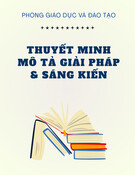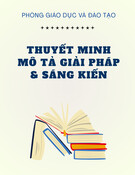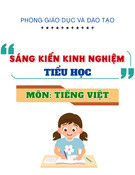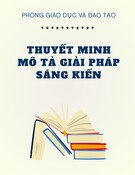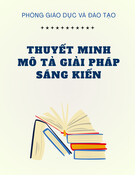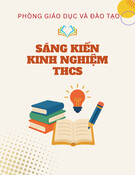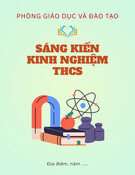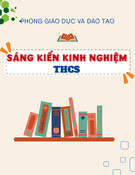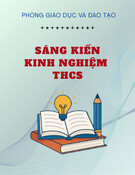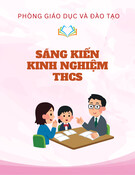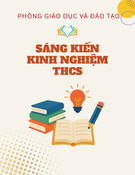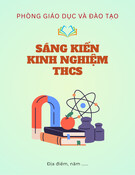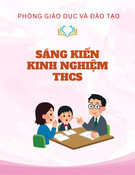
1
S GIÁO D C VÀ ĐÀO T O ĐNG NAIỞ Ụ Ạ Ồ
Đn v : ơ ị Tr ng THPT NGÔ QUY Nườ Ề
___________________
Mã s : …………………..ố
(Do HĐCNSK ghi)
SÁNG KI NẾ
USING PRE-READING ACTIVITIES TO HELP
STUDENTS FEEL MORE INTERESTED IN READING
Ng i th c hi n: ườ ự ệ BÙI PHÚ XUÂN
Lĩnh v c nghiên c u:ự ứ
- Qu n lý giáo d cả ụ
- Ph ng pháp giáo d cươ ụ
- Ph ng pháp d y h c b môn: Ti ng Anhươ ạ ọ ộ ế
-Lĩnh v c khác: …………………………….. ự
(Ghi rõ tên lĩnh v c)ự
Có đính kèm: Các s n ph m không th hi n trong b n in sáng ki nả ẩ ể ệ ả ế
Mô hình Đĩa CD (DVD) Phim nhả
Hi n v t ệ ậ
khác
(các phim, nh, s n ph m ph n m m)ả ả ẩ ầ ề
Năm h c: 2019-2020ọ
***

2
S GIÁO D C VÀ ĐÀO T O ĐNG NAIỞ Ụ Ạ Ồ
Đn v : ơ ị Tr ng THPT NGÔ QUY Nườ Ề
___________________
SÁNG KI NẾ
USING PRE-READING ACTIVITIES TO HELP
STUDENTS FEEL MORE INTERESTED IN READING
Ng i th c hi n: ườ ự ệ BÙI PHÚ XUÂN
Lĩnh v c nghiên c u:ự ứ
- Qu n lý giáo d cả ụ
- Ph ng pháp giáo d cươ ụ
- Ph ng pháp d y h c b môn: Ti ng Anhươ ạ ọ ộ ế
-Lĩnh v c khác: …………………………….. ự
(Ghi rõ tên lĩnh v c)ự
Năm h c: 2019-2020ọ
***

1
TABLE OF CONTENTS
INTRODUCTION …………………………………………..
1. Background …………………………………………........
2. Reasons for choosing the topic ……………………………
3. The scope of the research ……………………………........
4. The objective of the research ……………..………………
CONTENTS ………………………………………………….
I. RATIONALE OF THE RESEARCH ...……………………..
II. RESEARCH CONTENTS ……………………………………
1. Procedure ………………………………………………
Activity 1: Mind-mapping …………………………….
Activity 2: Matching ………...………….…………….
Activity 3: Competition Game - Hangman ………......
Activity 4 : Discussion … …………….…………….
Activity 5: Word Sort …………………..……...…….
2. Advantages and disadvantages of applying these Pre-
reading activities in the class. …………………….
3. Evaluation ……………………………………………….
a. Novelty of the research ………………………………
b. Evaluation of the research …………………………...
c. Applicability of the research ………………………..
CONCLUSION ………………………………………………...
REFERENCES …………………………………………………
Appendix 1 …………………………………………………….
Appendix 2 …………………………………………………….
Page
3
3
3
4
4
4
4
6
6
6
8
14
15
17
19
19
19
19
20
21
22
23
24

2
THÔNG TIN CHUNG V SÁNG KI NỀ Ế
1. Tên sáng ki n: ếUsing Pre-Reading Activities to Help Students Feel
More Interested in Reading
2. Lĩnh v c áp d ng sáng ki n: Ph ng pháp d y h c b môn.ự ụ ế ươ ạ ọ ộ
3. Tác gi :ả
-H và tên: BÙI PHÚ XUÂN Nam (n ): Namọ ữ
-Trình đ chuyên môn: Th c s Gi ng d y Ti ng Anhộ ạ ỹ ả ạ ế
-Ch c v , đn v công tác: Phó Hi u tr ng – Tr ng THPT Ngô ứ ụ ơ ị ệ ưở ườ
Quy nề
- Đi n tho i: 0918191335ệ ạ Email: bphuxuannq@gmail.com
-T l đóng góp t o ra sáng ki n (%): ỷ ệ ạ ế
100% 4. Đng tác gi (n u có): khôngồ ả ế
-H và tên: …………….......................……........... Nam ọ
(n ): ..................ữ
-Trình đ chuyên môn: …............................................................................ộ
-Ch c v , đn v công tác: ứ ụ ơ ị
…......................................................................
-Đi n tho i: …….......……….. Email: .........................................ệ ạ
…...........
-T l đóng góp t o ra sáng ki n (%): ...........................................................ỷ ệ ạ ế

3
TOPIC: USING PRE-READING ACTIVITIES TO HELP
STUDENTS FEEL MORE INTERESTED IN READING
INTRODUCTION
1. Background
Nowadays learning English is considered to be very essential in our modern
society because it is an international language which is necessary for many
different kinds of activities including education, politics, and socio-economics.
Knowing English also gives you golden chances to get a good job in a
multinational company in Vietnam or finding work abroad. What is more
English is one of the core subjects in all Vietnamese secondary schools, high
schools, colleges and universities. Therefore, classroom teaching is really a
demanding job.
Most Vietnamese teachers have to work with a class of forty five students or
more and there is usually a wide variety of abilities in each class. In reading
class, it is common that teachers always play the centred roles and explain
everything to students while students do nothing. As a result, they find no
pleasure or interest in reading lessons.
2. Reasons for choosing the topic
Through discussions with some of the teachers and students’ in my school I have
found out some problems in teaching and learning reading. Most teachers
choose the teaching career with the hope that they could spark the joy of
learning in their students. However, classroom teaching is a demanding job.
Teachers sometimes recognize that their students find no pleasure in the act of
reading.
Being an English teacher, what should we do to draw students’ attention and to
engage them in reading lessons as well as give them as many opportunities as
possible to take part in active activities in the classroom? This requires both
students’ and teacher’s efforts. However, it is our own job to make the
classroom a lively and communicative place. How can we create such a
classroom?
My experience has taught me that Pre-reading activities are very important for
helping students to understand the background of the text and help students feel
more interested in reading periods. They can spark students’ curiosity and

